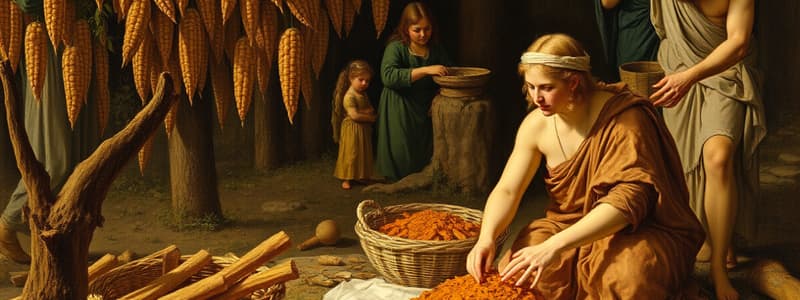Podcast
Questions and Answers
Who is Herodotus?
Who is Herodotus?
Greek writer of the fifth century B.C. known as the 'father of history.'
How were cinnamon sticks obtained according to the method mentioned?
How were cinnamon sticks obtained according to the method mentioned?
By cutting up dead oxen and using the meat to lure birds, which would then drop the cinnamon.
What was Theophrastus' point of view on collecting cinnamon?
What was Theophrastus' point of view on collecting cinnamon?
He believed cinnamon grew where it was guarded by deadly snakes, requiring protective gear.
How could spice harvesters drive off snakes according to Herodotus?
How could spice harvesters drive off snakes according to Herodotus?
What did Pliny the Elder think of the tales about spices?
What did Pliny the Elder think of the tales about spices?
Where did frankincense come from?
Where did frankincense come from?
What effect did the tales have on Arab traders?
What effect did the tales have on Arab traders?
What are spices derived from?
What are spices derived from?
What does the word 'spice' originate from?
What does the word 'spice' originate from?
What is the Alexandria Tariff?
What is the Alexandria Tariff?
What luxury items did the Alexandria Tariff contain?
What luxury items did the Alexandria Tariff contain?
Pepper appears on the Alexandria Tariff.
Pepper appears on the Alexandria Tariff.
What is the Cookbook of Apicius?
What is the Cookbook of Apicius?
Why were spices used in cooking?
Why were spices used in cooking?
From where were ginger and cinnamon hauled?
From where were ginger and cinnamon hauled?
How were spices related to embalming?
How were spices related to embalming?
How did spices influence European exploration?
How did spices influence European exploration?
What story is associated with the Indian sailor and Ptolemy III?
What story is associated with the Indian sailor and Ptolemy III?
Flashcards are hidden until you start studying
Study Notes
Historical Perspectives on Spices
- Herodotus: Fifth-century Greek writer known as the "father of history"; described the process of gathering cassia (a type of cinnamon) which involved wearing an ox-hide suit.
- Cinnamon Collection Method: Dead oxen chopped and left near bird nests to lure them, allowing harvesters to collect fallen cinnamon.
- Theophrastus' View: Cinnamon guarded by deadly snakes; safe collection required protective gear and leaving part of the harvest as an offering to the sun.
Tales and Skepticism
- Herodotus on Flying Snakes: Suggested smoke from burning storax was used by spice harvesters to drive away snakes.
- Pliny the Elder's Critique: Dismissed tales of spices as fabrications by Arabs to inflate prices, obscuring true origins from European buyers.
Geographic Origins of Spices
- Cinnamon and Frankincense: Frankincense sourced from Arabia; cinnamon originated from southern India and Sri Lanka; traded across the Indian Ocean.
- Wealth of Arab Traders: Exotic spice tales increased demand and prices, enhancing the wealth of Arab traders.
Definition and Characteristics of Spices
- Spice Composition: Includes dried saps, gums, resins, barks, roots, seeds, and dried fruits.
- Etymology: The Latin word "species" means "type" or "kind," linking to the modern understanding of spices.
Economic Importance of Spices
- Alexandria Tariff: A Roman fifth-century document listing items subject to import duty, including spices like cinnamon, cassia, and ginger, taxed at 25% at Alexandria port.
- Roman Use of Spices: Widely used in Roman cuisine, although pepper was notably absent from the Alexandria Tariff.
Culinary and Cultural Uses
- Apicius Cookbook: Compiled 478 recipes emphasizing the use of foreign spices such as pepper and ginger.
- Spices' Purpose: Utilized to mask the taste of spoiled meat; also employed in embalming processes to prepare the dead for the afterlife.
Exploration and Knowledge Expansion
- Influence on Exploration: Spices drove European explorations to discover their origins, including various dried products.
- The Indian Sailor's Encounter: An Indian sailor's story at the court of King Ptolemy VIII illustrates the cultural exchanges and misunderstandings in ancient trade routes.
Studying That Suits You
Use AI to generate personalized quizzes and flashcards to suit your learning preferences.




